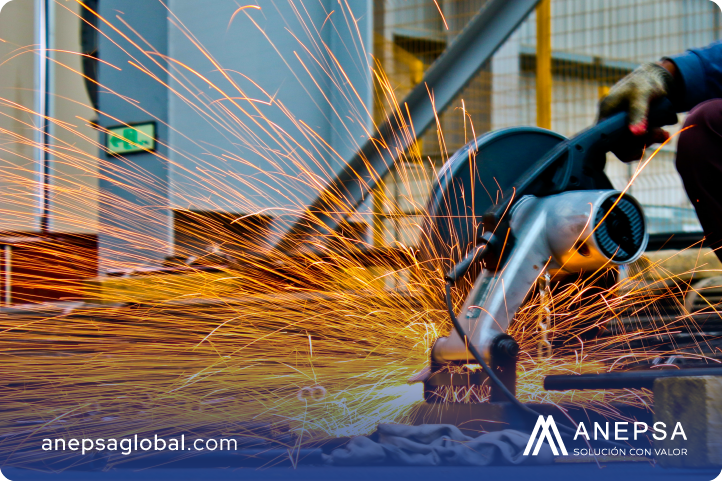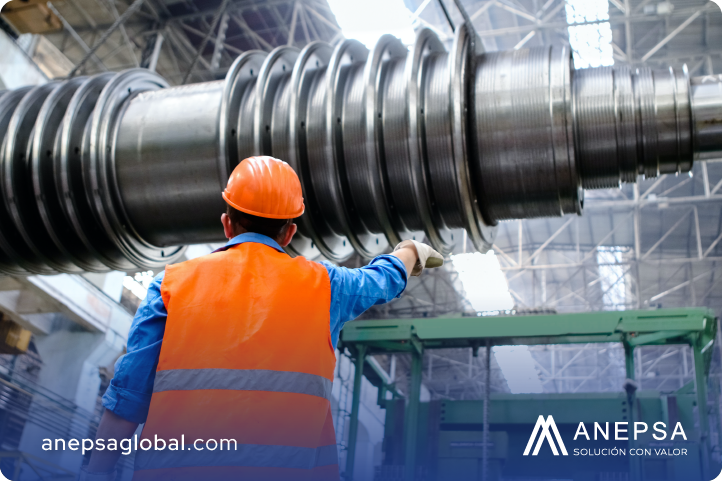INDUSTRIAL PLANT APPRAISAL
Industrial Plant Appraisal - Certified Appraisers
index

Valuation of an industrial plant is essential for effective financial management, strategic decision making, regulatory compliance and financial transparency. It helps companies understand the value of their assets, manage associated risks and take advantage of investment and growth opportunities.
- Financial decisions: Valuation provides crucial information for financial decisions such as the purchase, sale, investment or financing of the plant. It helps determine its fair value, which is essential for negotiations and transactions.
- Resource optimization: Knowing the value of the plant allows managers to optimize the use of financial and physical resources. This may include decisions about investment in technology, maintenance, expansion or reduction of production capacity.
- Risk assessment: Valuation helps assess risks associated with the plant, such as technological obsolescence, competition, regulatory or environmental changes, and operational risks. This allows for more effective risk management and proper planning to mitigate them.
- Accounting and reporting: For accounting and reporting purposes, it is necessary to have an accurate valuation of the industrial plant's assets. This affects the company's income statement, balance sheet, and other financial reports.
- Negotiations and transactions: In the case of mergers, acquisitions, joint ventures or associations, the valuation of the industrial plant is essential to determine the value of the company as a whole and its contribution to the transaction.
- Regulatory compliance: In many cases, there are regulations and standards that require regular valuation of industrial assets, especially in highly regulated industries such as energy, mining or chemical production.
What is an industrial plant appraisal?
The valuation of an industrial plant is a process that establishes the economic value of a facility or set of buildings intended for the production of goods or services. This process is essential for multiple purposes, including the purchase or sale of the plant, obtaining financing, business accounting, and determining property taxes, among others.
In order to carry out this valuation, various factors are considered, such as location, size, quality of the facilities, state of repair, machinery and equipment, as well as other elements that may affect their value. The expertise of professionals specialised in the valuation of industrial assets is often required. In addition, different methods can be applied, such as the cost approach, the market approach or the income approach, to accurately determine the value of the plant.
It is essential that the valuation of an industrial plant is carried out by certified experts, known as industrial appraisers, with specific experience in this type of evaluation. This ensures that the process is carried out in an accurate, objective and reliable manner.
Who carries out the appraisal of an industrial plant?
The appraisal of an industrial plant is carried out by professionals specializing in the valuation of industrial assets, known as industrial appraisers or appraisers. These experts have the training and experience necessary to correctly assess the economic value of an industrial plant or facility.
To be considered as industrial appraisers, these professionals usually have certifications and accreditations that support their ability to carry out accurate and objective appraisals. In addition, they have a deep knowledge of the different valuation methods and techniques, as well as the specific factors that influence the value of industrial plants, such as location, condition of facilities, machinery, equipment and other relevant elements.
It is important for the industrial appraiser to be impartial, objective and free from conflicts of interest to ensure the integrity and accuracy of the appraisal. Their work is essential to providing a reliable and informed valuation that serves as a basis for financial decisions, business transactions, regulatory compliance and other purposes related to industrial asset management.
Types of industrial plants
Industrial plants are classified according to the activity they perform, the products they produce or the processes they use. Some common types of industrial plants are:
- Manufacture: They focus on the production of physical goods such as automobiles, appliances and electronics.
- Food Processing:Food focused, such as canning, meat and dairy plants.
- Chemistry: They produce chemicals, such as refineries, petrochemical and fertilizer plants.
- Pharmaceutical: Specialized in medicines and pharmaceutical products.
- Automotive: They manufacture vehicles and automobile components.
- Textile and clothing: They produce fabrics and clothing.
- Energy: They generate energy through thermoelectric, hydroelectric, nuclear, solar and wind plants.
- MetallurgicalThey are dedicated to the production of metals such as steel, aluminum and copper.
- Construction and Materials: They manufacture materials such as cement, bricks and glass.
- Electronics: They produce electronic devices such as computers and mobile phones.
These categories represent an overview of industrial plants, and each may have subcategories based on their specialization and specific processes.
Purposes of an industrial plant appraisal
This type of valuation is essential for a variety of purposes, such as purchase-sale transactions, investment decisions, obtaining financing, insurance, accounting, among others. It is carried out by expert valuation professionals, who use specific methods and techniques to accurately establish the fair value of the industrial plant being evaluated.
Some of the most frequent purposes of this valuation are:
- Buy and Sell: Determine the market value of the industrial plant to facilitate its purchase or sale.
- Financing: Use the industrial plant as collateral to obtain financing or loans, requiring knowledge of its value.
- Insurance: Establish the insurable value of the plant to determine the appropriate insurance premium and ensure adequate coverage in the event of loss or damage.
- Accounting and Financial Reporting: Comply with accounting and financial requirements, including valuation of fixed assets for reporting and audits.
- Merger and Acquisition: Evaluate the value of the industrial plant in the context of mergers, acquisitions or business restructuring.
- Litigation and Arbitration: Resolve legal disputes related to plant ownership, such as divorces, partitions, expropriations or various litigation.
- Tax Determination: Establish the taxable value of the industrial plant for the calculation and payment of property taxes.
- Strategic Planning: Contribute to strategic planning and business decision making, such as expansion, relocation or closure of facilities.
- Lease Valuation: Determine the value of an industrial plant lease, for both the lessor and the lessee.
Factors to consider in an industrial plant appraisal
In an industrial plant valuation, multiple factors are evaluated that influence its value. These include the size and quality of the facilities, production capacity, technology used, service infrastructure (electricity, water, road access), market demand and other key elements such as:
- Location: The location of the industrial plant significantly impacts its value, considering aspects such as accessibility to raw materials, sales markets, transportation infrastructure and services.
- State of the Facilities: The physical condition of the facilities, including buildings, machinery, equipment and systems, is examined. Factors such as age, maintenance, obsolescence and efficiency of the assets are evaluated.
- Production capacity: The operational efficiency and flexibility of the plant to adapt to changes in demand are considered, which affects its ability to generate products or services.
- Technology and Processes: Technology and production processes are crucial. Obsolete technologies can decrease value, while modern technologies can increase it.
- Financial History: Past and current financial performance, including revenues, costs, profit margins and future projections, influence valuation.
- Regulations and Compliance: Compliance with environmental and safety regulations, as well as regulations in general, can affect value, especially if there are risks of non-compliance.
- Competition and Market: Industry competition and market conditions are assessed, considering demand for products or services, competition and market trends.
- Legal and Contractual Aspects: Lease contracts, employment agreements, licenses, permits and other legal aspects that may influence the operation and value of the plant are reviewed.
Approaches used for the valuation of an industrial plant
In the valuation of an industrial plant, various approaches and techniques are used to establish its value. Some of the most commonly used approaches are:
- Cost Approach: Value is determined by considering the cost of replacing assets and accumulated depreciation. The cost of constructing or replacing facilities and equipment is assessed, adjusted for depreciation and obsolescence.
- Market Focus: Information on recent sales of similar industrial plants is used to determine the value of the plant in question. Its characteristics are compared to those of other recently sold plants to estimate its value.
- Income Focus: It focuses on the income generated by the plant to determine its present value. Future income streams are projected, considering leases, occupancy, operating expenses and capitalization rates.
- Residual Approach: The residual value of the plant is established after deducting the costs of production, promotion and sale of its products or services. The value of the land and the remaining assets is considered after deducting costs associated with production and marketing.
These approaches can be applied individually or in combination, depending on the characteristics of the plant and the objectives of the valuation. It is common for appraisers to use multiple approaches to obtain a more accurate and complete valuation.
Can ANEPSA Global value my industrial plant?
Our company offers significant added value to our clients who acquire our industrial plant valuation services. We have a team of certified appraisers who guarantee an accurate and reliable valuation of the economic value of industrial facilities.
Furthermore, our team is multidisciplinary and highly professional, which allows us to approach each project from different perspectives and offer customized solutions tailored to the specific needs of each client. This combination of experience, certification and multidisciplinary approach allows us to deliver high-quality appraisals that are essential for our clients' strategic decision-making, financial transactions and regulatory compliance.
By choosing our services, clients not only get a reliable appraisal, but also the support of an expert team committed to excellence and customer satisfaction.



